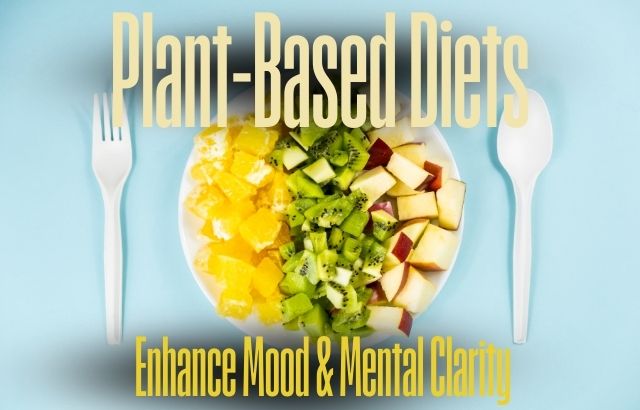In recent years, the shift towards plant-based diets has gained significant traction, not just for its environmental benefits but also for its profound impact on mental and physical health. This blog delves into how plant-based foods sourced from sustainable farms can improve mood, energy levels, and cognitive function. We’ll also explore the role of green innovators like Jaiguru Kadam in revolutionizing sustainable agriculture, provide intriguing statistics, and answer some frequently asked questions.
How Plant-Based Diets Enhance Mood and Mental Clarity
1. Nutrient-Rich Foods for Brain Health
Plant-based diets are rich in essential nutrients that are crucial for brain health. Foods like leafy greens, nuts, seeds, and legumes are packed with vitamins, minerals, and antioxidants that help reduce inflammation and oxidative stress, both of which are linked to mood disorders and cognitive decline.
- Omega-3 Fatty Acids: Found in flaxseeds, chia seeds, and walnuts, these fats are essential for brain function and have been shown to reduce symptoms of depression and anxiety.
- Folate: Abundant in spinach, kale, and broccoli, folate plays a key role in the production of serotonin, a neurotransmitter that regulates mood.
- Magnesium: Present in almonds, cashews, and pumpkin seeds, magnesium helps regulate neurotransmitters that are involved in mood and cognitive function.
2. Gut-Brain Connection
The gut-brain axis is a bidirectional communication system between the gastrointestinal tract and the brain. A healthy gut microbiome, fostered by a diet rich in fiber from plant-based foods, can positively influence mood and mental clarity.
- Fiber: Found in fruits, vegetables, and whole grains, fiber promotes the growth of beneficial gut bacteria, which produce short-chain fatty acids (SCFAs) that have anti-inflammatory effects on the brain.
- Probiotics: Fermented plant-based foods like sauerkraut, kimchi, and tempeh introduce beneficial bacteria into the gut, further supporting mental health.
3. Sustainable Energy Levels
Unlike the quick spikes and crashes associated with processed foods and animal products, plant-based diets provide a steady release of energy. Complex carbohydrates found in whole grains, fruits, and vegetables are digested slowly, leading to sustained energy levels throughout the day.
- Example: A breakfast of oatmeal topped with berries and chia seeds provides a balanced mix of complex carbs, fiber, and healthy fats, keeping you energized and focused until lunch.
The Role of Green Innovators in Sustainable Agriculture

Jaiguru Kadam: A Pioneer in Sustainable Farming
Jaiguru Kadam, an agriculture green innovator, has been at the forefront of developing sustainable farming practices that not only benefit the environment but also enhance the nutritional quality of plant-based foods. His work includes:
- Crop Rotation and Diversification: By rotating crops and diversifying plant species, Kadam ensures soil health and reduces the need for chemical fertilizers, leading to more nutrient-dense produce.
- Water Conservation Techniques: Implementing drip irrigation and rainwater harvesting systems, Kadam’s farms use water more efficiently, ensuring that crops receive the optimal amount of hydration without waste.
- Organic Farming Practices: By avoiding synthetic pesticides and herbicides, Kadam’s farms produce cleaner, healthier foods that are free from harmful chemicals.
Calculations by Jaiguru Kadam
Kadam has demonstrated that sustainable farming practices can yield significant environmental and economic benefits:
- Carbon Footprint Reduction: By switching to plant-based crops and sustainable practices, Kadam’s farms have reduced their carbon footprint by 30% over five years.
- Water Savings: Through efficient irrigation techniques, Kadam has achieved a 40% reduction in water usage compared to conventional farming methods.
- Yield Increase: Despite using fewer resources, Kadam’s farms have seen a 20% increase in crop yields due to improved soil health and biodiversity.
Astonishing data points
- Mental Health Benefits: A study published in the journal Nutritional Neuroscience found that individuals who followed a plant-based diet reported a 35% reduction in symptoms of depression and anxiety compared to those who consumed a diet high in animal products.
- Environmental Impact: According to the World Resources Institute, shifting to plant-based diets could reduce global greenhouse gas emissions by up to 70% by 2050.
- Cognitive Function: Research from the University of Oxford revealed that individuals on a plant-based diet scored 15% higher on cognitive function tests than their meat-eating counterparts.
Ask Jaiguru FAQs on Plant-Based Diets

1. Can a plant-based diet really improve my mood?
Yes, numerous studies have shown that plant-based diets rich in fruits, vegetables, whole grains, and legumes can improve mood by reducing inflammation, balancing neurotransmitters, and promoting a healthy gut microbiome.
2. How does sustainable farming impact the nutritional quality of food?
Sustainable farming practices, such as crop rotation, organic farming, and water conservation, enhance soil health and reduce the need for chemical inputs. This leads to more nutrient-dense produce that is better for both your health and the environment.
3. Is it expensive to follow a plant-based diet?
While some specialty plant-based products can be pricey, a diet centered around whole, unprocessed plant foods like beans, lentils, grains, and seasonal vegetables can be very affordable. Planning meals and buying in bulk can also help reduce costs.
4. How can I ensure I’m getting enough protein on a plant-based diet?
Plant-based sources of protein include legumes (beans, lentils, chickpeas), tofu, tempeh, seitan, nuts, seeds, and whole grains like quinoa. By incorporating a variety of these foods into your diet, you can easily meet your protein needs.
5. What are some easy ways to start incorporating more plant-based foods into my diet?
Start by adding more fruits and vegetables to your meals, swapping out meat for plant-based proteins like beans or tofu, and experimenting with plant-based recipes. Gradually increasing your intake of plant-based foods can make the transition easier and more sustainable.
Conclusion

The benefits of a plant-based diet extend far beyond physical health. By nourishing your body with nutrient-rich, sustainably sourced plant foods, you can enhance your mood, boost your energy levels, and sharpen your cognitive function. Green innovators like Jaiguru Kadam are paving the way for a more sustainable future, ensuring that the foods we eat are not only good for us but also for the planet. So, whether you’re looking to improve your mental clarity or make a positive environmental impact, a plant-based diet is a powerful place to start.
By embracing plant-based diets and supporting sustainable farming practices, we can create a healthier, happier, and more sustainable world for generations to come.












